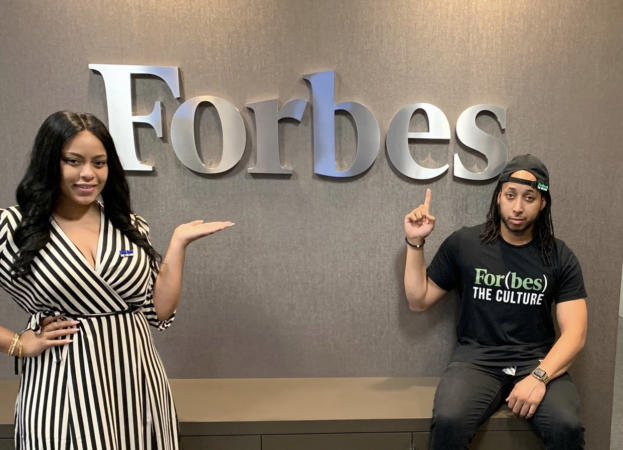There’s a huge demand for spaces dedicated to diverse communities. People of color and Black innovators have long since grown tired of the lack of inclusion in the professional space, and many are taking matters into their own hands. When opportunity is not present, it calls for changes to be made, and in today’s landscape of young professionals, it’s very much needed.
Two millennial entrepreneurs wanted to create a space for Black leaders, but instead of fighting for a seat at the table, these optimistic innovators decided to build their own.
Philly natives Rashaad Lambert and Vinasia Miles had a common goal in mind when they created For(bes) the Culture, which stemmed from their shared experiences at the 2017 Forbes Under 30 Summit in Boston, MA.
“There weren’t a lot of people of color in attendance, but there also weren’t a lot of things geared toward people of color,” Lambert said. “We were invited but not included.”
Miles often uses the analogy “there were only a few pepper flakes in the salt shaker” to refer to the lack of people of color in attendance.
Even before the 2017 Summit in Boston, Lambert shared that he had not observed many people of color at previous Forbes’ Under 30 Summits either.
Forbes annual Under 30 Summits are “more an immersive experience than a static conference,” according to their website. The summit brings together thousands of talented leaders, founders, investors, and creators from all over the world to network and engage in future-building conversations.
The Summits feature panel discussions dedicated to various topics including business, sports, entertainment, and cultural issues.
The main concern for Lambert and Miles was that they weren’t seeing results that catered to people of color. Even worse, inclusion didn’t show up in places it should’ve — specifically in the diversity panel discussions.
The Under 30 Summit’s diversity panel in 2016 consisted of three Caucasian men discussing inclusion in the workplace and referring to people of color as “minorities.”
“I didn’t appreciate seeing all of the people of color that were on the under 30 list and advertised on social media, but not represented at the conference,” said Lambert. “They didn’t have the same spotlight on them as the other entrepreneurs.”
Lambert also attested that in 2017, the Summit attempted to fix their diversity issue, but still failed to acknowledge people of color, only inviting a Caucasian woman to fill the diversity void alongside two Caucasian men for the panel.
After hearing the outrage from their colleagues, Lambert alongside Miles, decided to take a stand and provide what Forbes wasn’t delivering to the conference’s attendees.
After speaking with a few folks from the conference, Lambert said he teamed up with Miles to bring together a small group of people to have a productive conversation about things affecting people of color in the professional world that only they could relate to.
The idea behind this planned discussion was to engage with other attendees and discuss the state of the culture.
What started as a small gathering planned for 25-30 people at Anthem Kitchen & Bar — a restaurant in Boston — grew to a meeting of 300 people in the crowded restaurant to have a real dialogue about making change for people of color at these conferences and in the industry.
The original plan wasn’t to turn For(bes) the Culture into a full-blown organization, but feedback from other people inspired Lambert and Miles to expand it into more.
For(bes) the Culture has international ties with over 5,000 members touching numerous countries, including the Caribbean, Germany, United Kingdom, France, Nigeria, Ghana, Tanzania, New Zealand, both North and South Korea.
As of July 2019, the organization is an official partner of Forbes, “endorsing and supporting the network as it helps drive diverse representation,” according to the publication.
“We made so much noise,” said Miles on their partnership with Forbes.
Following their first-ever international Under 30 Summit, Forbes caught wind of For(bes) the Culture’s initiative as the organization’s presence continued to grow.
Miles shared that For(bes) the Culture created so much buzz that in addition to their Forbes partnership, it ultimately led to the organization having their own stage during the 2019 Under 30 Summit in Detroit, MI.
Under the publication’s network, For(bes) the Culture can tackle systemic issues relating to diversity and inclusion, while increasing representation for various racial and ethnic groups around the world.
For(bes) the Culture provides people of color, and Black leaders with mentorship, business alliances, and lanes for more entrepreneurial opportunities.
Now having a solid presence with their audience, their focus is to “create equitable pathways for people of color.”
“We have never been given a fair opportunity to pursue wealth, and now that we have somewhat of an opportunity, we want to continue to push forward to create wealth for future generations,” said Lambert.
Currently, the organization hosts Culture Talks every Monday via Instagram Live for what Miles says are “things that may be plaguing our culture through industry perspectives.”
To learn more about For(bes) the Culture, visit their website.
Editorial Note: This article has been updated since being published.

